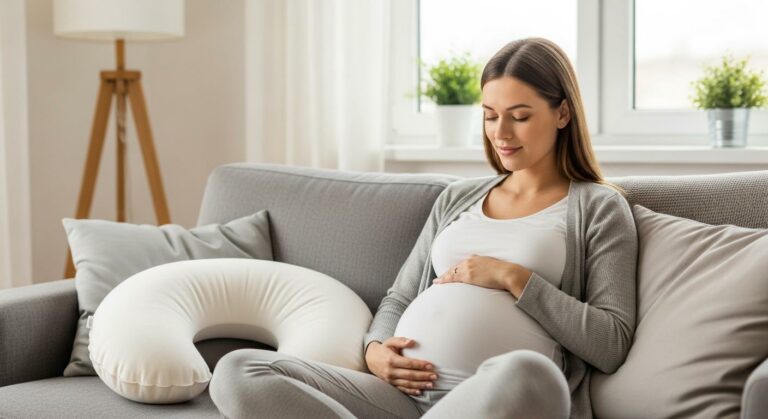Few experiences recalibrate a parent’s daily rhythm quite like frequent urination pregnancy. One moment, you’re trying to keep pace with a work deadline or a child’s bedtime ritual; the next, you’re tallying yet another impromptu sprint to the bathroom. An avalanche of questions often follows: “Is this amount of urgency normal? Could this signal a bigger health issue? How long will this last, and more importantly, can anything simplify these constant interruptions?” For parents navigating these choppy waters, understanding the intricate interplay of hormones, organs, and adaptation is more than mere curiosity—it’s survival. This exploration unravels why frequent urination pregnancy emerges, details how and when to seek professional advice, and shares science-backed strategies to reclaim comfort—even when the nearest restroom seems endlessly far.
What triggers frequent urination pregnancy? Medical and physiological deep dive
From the very first weeks, the body sets an elaborate sequence in motion. Why does frequent urination pregnancy become so relentless?
- Hormonal surges and kidney stimulation: Implantation kicks off a steep rise in human chorionic gonadotropin (hCG), a hormone pivotal in early pregnancy and—perhaps less well-known—a catalyst for kidney hyperactivity. Blood flow to renal tissues increases, transforming the bladder into a sensitive vessel that signals urgency after even minimal filling.
- Progesterone’s subtle sabotage: Elevated progesterone works double-time, relaxing smooth muscle fibers across the body, including your bladder and pelvic architecture. Result? The once-reliable pelvic floor offers less resistance; laughter, exercise, or a stray sneeze might catch you unprepared.
- Volume overload and filtration demands: Blood volume surges—some estimates say a jump of 30–50%. The kidneys, on overdrive, filter up to 80% more plasma. Naturally, this means more urine and a bladder that fills at surprising speed.
- Mechanical pressure from uterine expansion: As the uterus transitions from plum-sized to taking center stage, it quite literally crowds out the bladder. Even a small quantity of urine can trigger that all-too-familiar sense of urgency.
Frequent urination pregnancy isn’t just a trivial complaint; these mechanisms are fundamental adaptations, finely tuned to support both parent and fetus.
How does frequent urination pregnancy evolve across trimesters?
Rhythms shift with time. You may wonder: Does it ever calm down?
- First trimester: Frequent urination pregnancy tends to debut early and fiercely. Hormonal acceleration, coupled with pelvic congestion, means bathroom trips become a central focus.
- Second trimester: Relatively calmer waters, for many. As the uterus rises above the bladder, pressure diminishes, granting a temporary reprieve—nights may quiet, and daytime urgency may ease. Yet, exceptions abound, and some experience continued symptoms.
- Third trimester: The cycle restarts. The descending fetus returns all focus to the bladder, compressing it so thoroughly that even a trickle feels pressing.
After childbirth, expect a brief period of increased urination as the body jettisons excess fluid, typically stabilizing within days to weeks.
Daily life, sleep, and social rhythm: The ripple effects of frequent urination pregnancy
A disrupted night’s sleep, interrupted meetings, anxiety over unexpected leaks—frequent urination pregnancy can touch every aspect of a parent’s day. Planning outings centered around restroom availability becomes second nature. Emotional impacts are just as real; irritability, fatigue from fragmented nights, and occasional self-consciousness shadow many with this symptom. Recognizing and validating these hurdles is the first step. No need to brush them aside as mere inconveniences—these ripple effects can be significant.
Strategies for managing frequent urination pregnancy: Medically grounded and practical
Regaining a foothold over bladder unpredictability often requires both scientific understanding and day-to-day tactics. What helps most?
- Thoughtful hydration routines: It’s tempting to cut back on fluids, but adequate water intake (usually around 1.5 to 2 liters, or 8–12 cups daily) safeguards kidney health and prevents dehydration. Try front-loading fluids in the morning and tapering off closer to bedtime to minimize night interruptions.
- Limiting dietary diuretics: Caffeine (coffee, energy drinks, sodas), artificial sweeteners, and alcohol intensify bladder irritability. Pare them back to see tangible results.
- Clothing choices matter: Skip restrictive belts and tight waistbands. Instead, opt for stretchy fabrics and cotton underwear to allow freedom of movement and airflow, which can relieve pressure and irritation.
- Act promptly: Resist the temptation to delay bathroom visits. Retaining urine increases infection risk and can strain bladder muscle function. Emptying the bladder before travel, sleep, and physical activity can preempt unnecessary stress.
- Routine, not randomness: Set a schedule—planned bathroom trips (before outings, before bed, and at intervals throughout the day) reduce accident anxiety.
- Protection with dignity: Specially designed liners or pads (breathable, hypoallergenic) offer peace of mind, especially later in pregnancy when the pelvic floor’s resilience wanes.
- Gut health and fiber: Constipation increases abdominal and bladder pressure. Upping intake of whole grains, fresh fruits, and vegetables helps bowel regularity and prevents extra strain.
Empowering the pelvic floor: Exercise and healthy habits for symptom relief
Frequent urination pregnancy often means the pelvic floor works overtime. Strengthening these muscles pays dividends both now and long after delivery.
- Kegel exercises: Simple but profoundly effective, Kegels train the pelvic floor to contract and release, ideally holding for 5–10 seconds, repeated ten times, three times daily. Their discretion means they fit into almost any routine.
- Optimized toileting posture: Leaning forward while urinating encourages complete emptying—this small adjustment can reduce the volume of residual urine, lowering infection risk.
- Timed voiding: Regular bathroom breaks prevent bladder over-distension, which can weaken muscle tone and increase susceptibility to infections.
Damage to the pelvic floor isn’t inevitable; proactive care shapes better long-term outcomes for both continence and postpartum recovery.
Hygiene and dietary precision: Small details, big impact
Intimate well-being in pregnancy is a delicate balance requiring both gentle care and dietary mindfulness.
- Wiping technique: Always wipe front to back to prevent transfer of intestinal bacteria to the urinary tract—a move especially important in pregnancy.
- Urinate after intercourse: This familiar advice holds particular value; swift urination after sex helps flush out bacteria before they can ascend the urinary tract.
- Select mild hygiene products: Harsh soaps, fragrances, or wipes can destabilize the local microbiome, increasing susceptibility to irritation and infection. Stick to unscented, gentle options.
- Alkaline-food emphasis: Some research hints that more alkaline urine (encouraged by green vegetables, select fruits, and nuts) might make the urinary tract less prone to irritation, though scientific consensus remains open. At minimum, these foods nurture overall vitality.
- Cranberry with caution: While cranberry is sometimes recommended to lower urinary tract infection risk by affecting bacterial adherence, never start any supplement without a doctor’s approval—especially during pregnancy.
When to worry: Safety nets and warning signs in frequent urination pregnancy
Despite its routine nature, frequent urination pregnancy can occasionally signal a developing infection or complication. Red flags include the onset of:
- Burning, stinging, or pain during urination
- Noticeable change in urine odor, color, or cloudiness
- Presence of blood
- Fever, chills, or pain in the lower back or pelvis
- Persistent contractions before term, or significant changes in urination patterns
- Inability to pass urine, extreme fatigue, or dizziness
Urinary tract infections (UTIs), kidney involvement (pyelonephritis), and even preterm labor all demand urgent medical attention. For parents using fertility treatments or IVF, new or exaggerated symptoms should always prompt swift consultation.
Special considerations after IVF and fertility treatments
Frequent urination pregnancy is often intensified in those who have undergone assisted reproductive technology. Hormonal stimulation, rapid fluid shifts, and sometimes unusually fast uterine growth combine to amplify the signal. If you fall into this group, any deviation from your normal should be discussed with your care provider or reproductive medicine specialist—no concern is too small.
Complementary strategies: Weighing natural options with medical advice
Interest in “natural” solutions—think dietary tweaks, herbal supplements, and even behavioral therapies—is rising. While some find value in approaches like cranberries or alkaline diets, clear evidence in pregnancy is still emerging, and supplements may not be safe for everyone. Consultation with your doctor, midwife, or a specialized health professional should always shape how you integrate these tools into your care plan.
Key takeaways
- Frequent urination pregnancy is not a trivial inconvenience; it’s the result of intersecting hormonal, vascular, and anatomical factors, changing along with each trimester and deeply personal in its effects.
- Practical, science-backed solutions exist—hydration optimization, pelvic floor exercises, gentle hygiene, and dietary adjustments all have a place.
- Closely monitor for any signs of infection or sudden symptom changes. Professional guidance is indispensable if pain, fever, blood, or difficulty urinating emerge.
- No single approach works universally. Parents should feel empowered to tailor strategies, adopt new habits, and reach out for support.
- For streamlined health advice and instant access to expert resources—including personalized tips and free health questionnaires for your child—explore the Heloa app.
Navigating the ebb and flow of frequent urination pregnancy demands patience, adaptation, and a dash of humor. By cultivating self-awareness, seeking support, and arming yourself with genuine knowledge, you can embrace the journey—bathroom breaks and all—with greater confidence and well-being.
Questions Parents Ask
Can frequent urination be an early sign of pregnancy?
Yes, frequent urination can appear very early—sometimes within two or three weeks after conception. For some parents, this change is one of the first indicators of pregnancy. It’s linked to hormonal shifts, especially the rise in hCG, and increased blood flow to the pelvic area. If you notice more frequent restroom visits before other typical symptoms like nausea, there’s no need to worry—this early sign is common.
Will frequent urination go away after pregnancy?
Generally, the need to urinate more often decreases soon after birth, as fluid balance returns to normal and the uterus shrinks back to its pre-pregnancy size. However, it’s possible to experience some bladder sensitivity for a few weeks postpartum, especially if the muscles have been stretched or weakened. Most parents find that comfort and normal routines return gradually. If symptoms persist or worsen, a supportive conversation with a healthcare professional can help clarify next steps and provide reassurance.
Is it normal to experience frequent urination at night during pregnancy?
Yes, increased nighttime urination, also called nocturia, is common during pregnancy. The body processes fluids differently, especially as you rest; this can lead to more frequent nighttime trips to the bathroom. Hormonal changes and the way your kidneys work to eliminate waste often make this symptom more pronounced at night. Creating a calm, predictable bedtime routine and adjusting when you drink fluids may help limit sleep disturbances—though some interruptions are entirely normal and very common.









